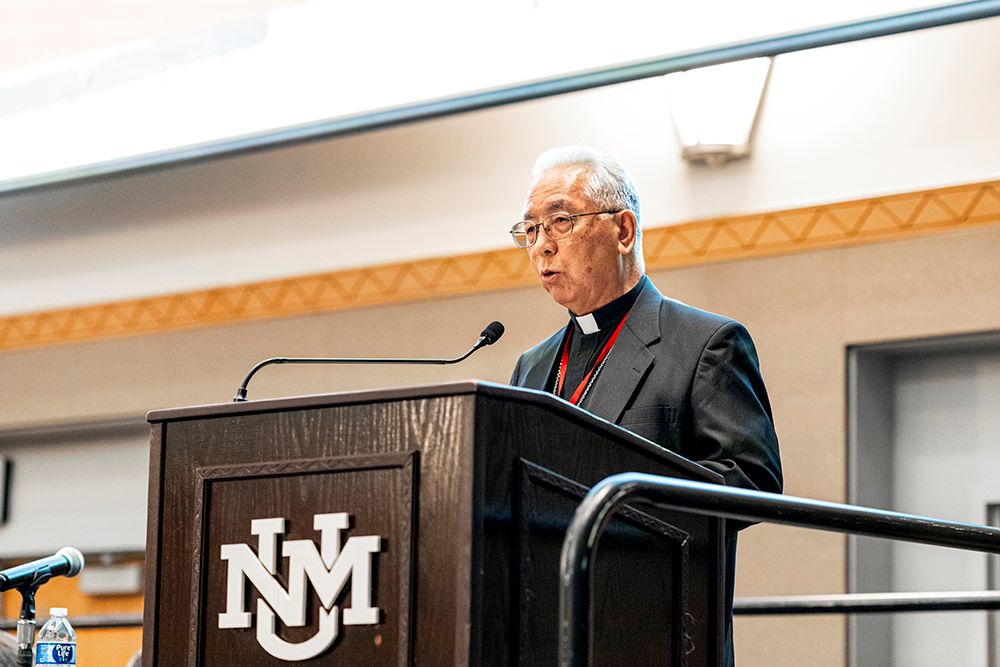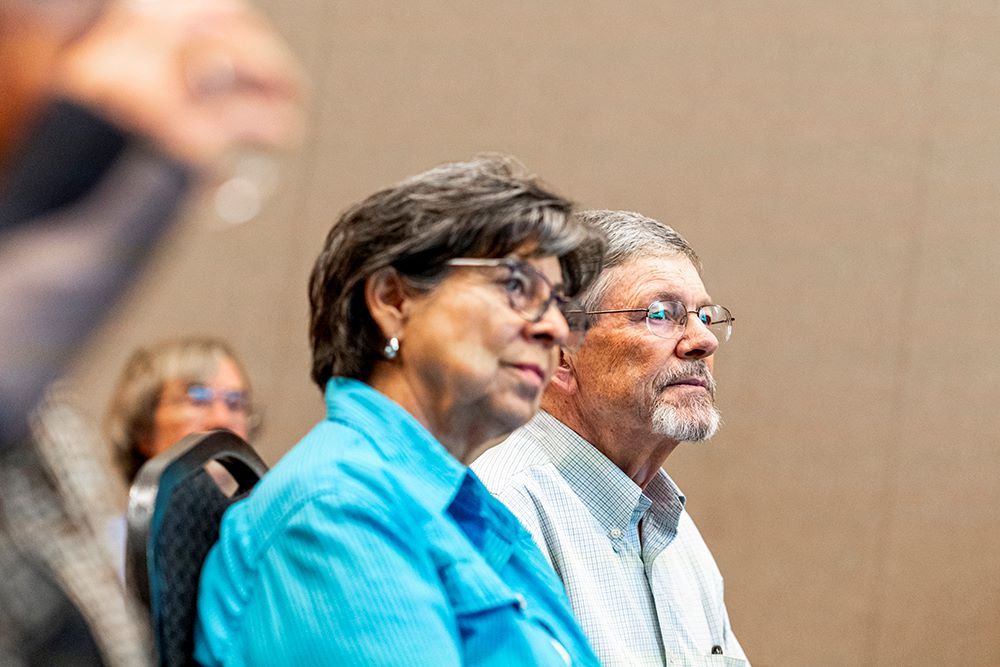
Retired Archbishop Joseph Mitsuaki Takami of Nagasaki addresses the "Forum on Nuclear Strategy: Disarmament & Deterrence in a Dangerous World" at the University of New Mexico Sept. 7. Takami is an in utero survivor of the atomic bomb the U.S. detonated Aug. 9, 1945 over Nagasaki, Japan. (University of New Mexico/Elizabeth Silva)
Tina Cordova has made it her life's work to shed light on the negative health effects plaguing the people of New Mexico after the U.S. military detonated the world's first atomic bomb at the Trinity test site July 16, 1945. To grasp the severity of the radiation exposure, Cordova says, "it's important to understand our way of life."
New Mexicans in that era relied on rivers and creeks as their main water source, and they ate what they cultivated from the soil. The radiation fallout from the detonation contaminated those sources. "We were maximally exposed," says Cordova, who was raised in a town 45 miles from where the Trinity bomb was detonated.
Cordova, a cancer survivor diagnosed with thyroid cancer at 39, says she's the fourth generation in her family to have cancer since 1945. The co-founder of the Tularosa Basin Downwinders Consortium, Cordova has advocated for the expansion of the Radiation Exposure Compensation Act to include those who lived around the Trinity test site who have never been compensated. The U.S. government, Cordova says, has failed to reconcile with the aftermath of the nuclear test. But she's encouraged by the role of Catholic leadership supporting their efforts. In May, a committee of the U.S. Conference of Catholic Bishops, wrote a letter advocating for the RECA expansion.
"We cannot have dialogues about the future of disarmament and deterrence without reconciling with our past, and we have never reconciled with our past," Cordova said. "We continue to bear this burden."
'These weapons are made by human hands to kill our fellow human beings, and therefore have no place on the planet.'
—Archbishop Joseph Mitsuaki Takami
Cordova told her story Sept. 7 at the "Forum on Nuclear Strategy: Disarmament & Deterrence in a Dangerous World" at the University of New Mexico, where nuclear experts, policymakers and advocates, gathered to share Catholic and secular approaches toward nuclear disarmament and deterrence. The event — led by the University of Southern California's Institute for Advanced Catholic Studies, the Endowed Chair of Roman Catholic Studies at the University of New Mexico and UNM's Religious Studies Program — was the culmination of several closed-door discussions.
Cardinal Robert McElroy of San Diego, who took part in those discussions, noted the long tradition of Catholic teaching addressing the need for abolition of nuclear weapons, as well as confronting how policymakers and societies could do so in a "responsible way that's not destabilizing."
McElroy cited Pope John Paul II, who in a message to the United Nations in June 1982 said that deterrence could be judged as "morally acceptable" as "a step on the way toward a progressive disarmament." However, McElroy noted, Pope Francis has moved the teaching with the 2017 declaration that the "very possession" of nuclear weapons is "firmly condemned."
Much of the closed-door discussions, McElroy said, dealt with some participants viewing deterrence as necessary for the long term, while others felt the need to move rapidly toward the elimination of nuclear weapons.
Among those attending the forum was Rose Gottemoeller, former deputy secretary general of NATO, who argued in favor of modernizing nuclear capabilities as a way to bring Russia and China back to the negotiating table. Gottemoeller noted a "history of honest and hard work on the nuclear disarmament agenda," but said that China and Russian leaders Xi Jinping and Vladimir Putin have interrupted those efforts.

Participants listen to discussion during the "Forum on Nuclear Strategy: Disarmament & Deterrence in a Dangerous World" at the University of New Mexico Sept. 7. (University of New Mexico/Elizabeth Silva)
Ira Helfand, with the International Steering Group of the International Campaign to Abolish Nuclear Weapons, sees things differently. "We’re on the brink of nuclear war … and if we don't get rid of these weapons soon, they're going to get rid of us," Helfand said at the forum. Helfand disagreed that threatening China and Russia with more weapons will bring their leaders back into dialogue.
Archbishop John Wester of Santa Fe participated in the forum and said efforts to eliminate nuclear weapons can progress when "reasonable and good-willed people enter into a critical conversation." These are the kinds of discussions Wester sought to stimulate after the 2022 release of his 52-page pastoral letter, "Living in the Light of Christ's Peace: A Conversation Toward Nuclear Disarmament," that challenges conventional political thinking that possessing nuclear weapons serves as a deterrence to potential attacks from other nuclear powers.
Wester wrote that the Archdiocese of Santa Fe has a special responsibility to support the Treaty on the Prohibition of Nuclear Weapons since New Mexico hosts two of the nation's three nuclear weapons laboratories, the Los Alamos and Sandia National Laboratories. Additionally during World War II, he said, "much of the land for the Los Alamos Lab was seized from Native American ancestral lands and Hispanic homesteaders without adequate compensation, continuing the legacy of colonialism, racism and systemic violence."
Advertisement
The archbishop, in the document, also calls attention to those working in the weapons industry and advocates for employment and economic opportunities that don't require "morally problematic nuclear weapons jobs."
While there are military and political ways to approach nuclear disarmament, Wester said it can also be done by centering people. At the Sept. 7 gathering, he spoke of retired Archbishop Joseph Mitsuaki Takami of Nagasaki and of Masao Tomonaga, vice president of the International Physicians for the Prevention of Nuclear War, who both survived the U.S. detonation of the second atomic bomb on Nagasaki on Aug. 9, 1945.
"They are living examples of the need to abolish nuclear weapons," he said.
Takami took part in the forum and advocated for the abolition of nuclear weapons. He spoke of peace activists and young people working toward the elimination of nuclear weapons, while "political leaders of the nuclear weapons states are not listening."
"These weapons are made by human hands to kill our fellow human beings, and therefore have no place on the planet," said Takami, an in utero atomic bomb survivor who lost several members of his extended family in the Nagasaki bombing. Political leaders, he said, must end their dependence on nuclear deterrence.
"Instead of investing in the production and development of nuclear weapons, they should make use of their immense resources and wealth to restore the polluted and destroyed environment, and to eradicate poverty," Takami said.







